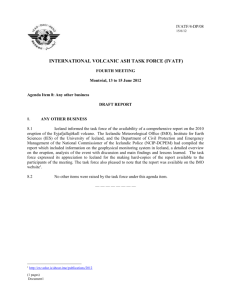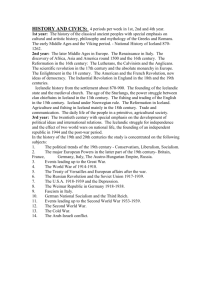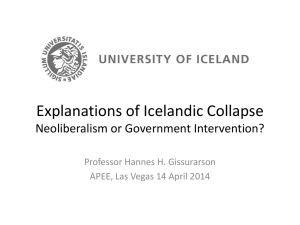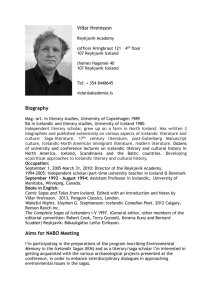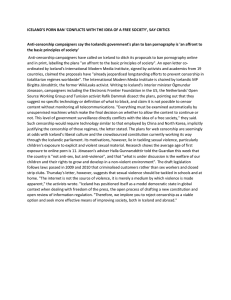A Speech by the President of Iceland Ólafur Ragnar Grímsson
advertisement
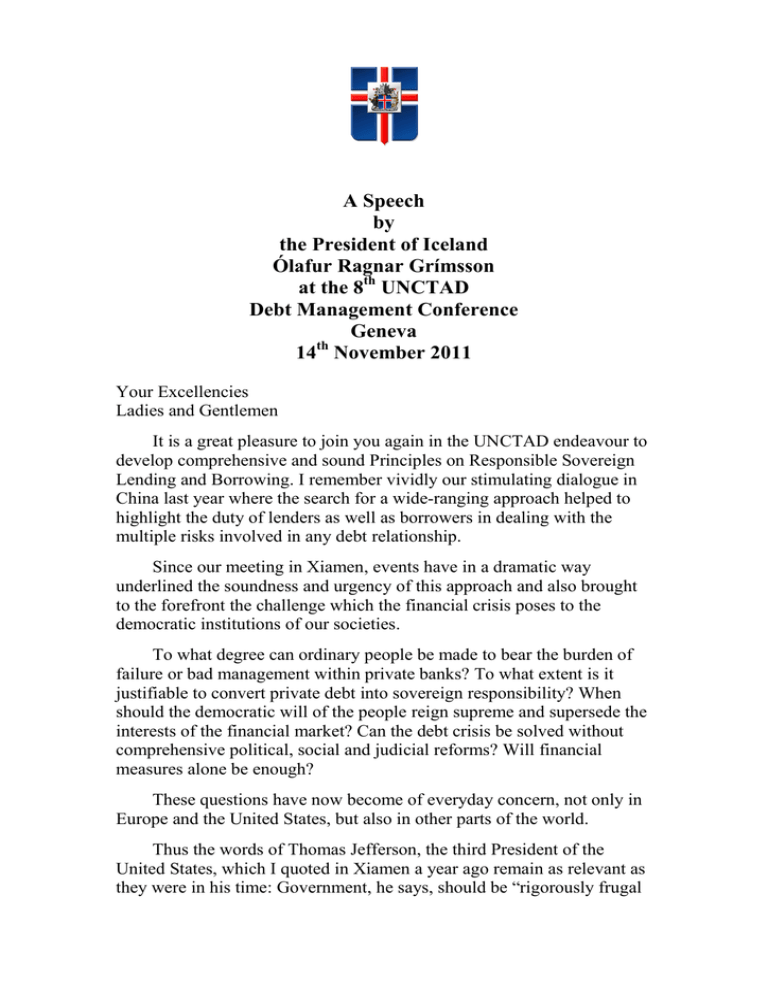
A Speech by the President of Iceland Ólafur Ragnar Grímsson at the 8th UNCTAD Debt Management Conference Geneva th 14 November 2011 Your Excellencies Ladies and Gentlemen It is a great pleasure to join you again in the UNCTAD endeavour to develop comprehensive and sound Principles on Responsible Sovereign Lending and Borrowing. I remember vividly our stimulating dialogue in China last year where the search for a wide-ranging approach helped to highlight the duty of lenders as well as borrowers in dealing with the multiple risks involved in any debt relationship. Since our meeting in Xiamen, events have in a dramatic way underlined the soundness and urgency of this approach and also brought to the forefront the challenge which the financial crisis poses to the democratic institutions of our societies. To what degree can ordinary people be made to bear the burden of failure or bad management within private banks? To what extent is it justifiable to convert private debt into sovereign responsibility? When should the democratic will of the people reign supreme and supersede the interests of the financial market? Can the debt crisis be solved without comprehensive political, social and judicial reforms? Will financial measures alone be enough? These questions have now become of everyday concern, not only in Europe and the United States, but also in other parts of the world. Thus the words of Thomas Jefferson, the third President of the United States, which I quoted in Xiamen a year ago remain as relevant as they were in his time: Government, he says, should be “rigorously frugal and simple, applying all the possible savings of the public revenue to the discharge of the national debt.” Indeed, he “placed economy among the first and most important republican virtues and public debt as the greatest of the dangers to be feared”. If governments had been more Jeffersonian in recent years and decades, many countries and the global financial system could have avoided, at least to some extent, the series of crisis meetings on national economies and the global financial system, the dramatic summits and hourly suspense which we have witnessed this autumn. The need for comprehensive reforms and wide-ranging measures is now recognized by all and therefore the UNCTAD proposal on the Principles is not only timely but could also form an important pillar in the new global financial structure. In their present form, the Principles emphasize the responsibilities of borrowers and deal extensively with the duties of lenders. This is of fundamental importance: To recognize that the stability and the success of debt relationships also depends on responsible actions, an on examination and monitoring carried out by the lenders. The causes of failure are not to be found exclusively with the borrowers. Furthermore, the present draft of the Principles seems to harmonize well with prevailing international emphasis on transparency, due diligence, good faith and the public interest, although this last element could be developed further in the light of recent events as illustrated by my own country. The financial crisis in Europe is a reminder that the somewhat arrogant Western view, which prevailed in recent decades, that the problems of excessive debt were solely relevant for developing countries – has become dramatically outdated. Europe is now the most urgent testing ground of financial crisis management. There, two fundamental dilemmas have been brought to the forefront. First, how far, if at all, the state should be forced to shoulder the responsibility for debt created by private banks. Or, to put it differently: Should ordinary people, the nation, be responsible for bad management of private financial institutions, especially if the potential losses are due to operations in foreign countries? Should we have a banking system which privatises the profits but socialises the losses and turns private failures into sovereign debt? 2 The second dilemma goes to the heart of our democracies: if a conflict arises between the interests of the financial markets and the will of the people, which should reign supreme: the market or the people? Some might argue that these questions are only theoretical, but events, not only in my own country but also elsewhere in Europe and the United States, have made them urgent. They can no longer be avoided when dealing with the financial crisis; have become a fundamental dimension of 21st century debt management. Let me illustrate this by a brief description of events in my own country. In the last decades of the 20th century and the first years of the 21st, economic policymaking in Iceland, just as Europe and in the United States, was greatly influenced by the prevailing laissez-faire ideology: the belief that, with privatisation, deregulation and the growth of privatelyowned financial institutions, the future would bring prosperity to all. The state-owned banks were sold and the country aligned itself with European financial markets through the EEA Agreement at a time when the globalisation of finance was rapidly transforming the old way of doing things. Markets were awash with money, and Icelandic banks and entrepreneurial companies did not hesitate in taking advantage of the situation. All this became a complicated story and many mistakes were made by bankers, by entrepreneurs, by regulatory authorities, by all of us in elected positions and by our partners in other countries. Then, in October 2008, Iceland was hit by a financial tsunami which came on top of a developing recession caused by huge domestic macroeconomic inbalances built up during the boom. Within a few months, the collapse of the banks started to threaten the stability of our democratic system and the cohesion of our society. There were protests and riots; the police had to defend the Parliament and the Prime Minister‟s Office. Suddenly, the traditional balance of our wellestablished republic was suddenly in danger. Iceland had been one of the most peaceful and harmonious societies in the world. Yet the financial and economic crisis threatened the survival of our political and social order. It brought us close to collapse. It was a sobering warning of what a breakdown of the financial system could do to countries which have not been blessed with old-established democratic traditions. If such a threat could emerge in Iceland, what about other countries with a shorter democratic history? 3 Many seek solutions to the profound problems now facing Europe through economic and financial measures alone; almost every day the assertion is made that the supremacy of the market should continue to subject other dimensions of these societies to its needs. Here again, Iceland can provide significant guidelines, lessons of how economic measures and reforms did not by themselves succeed in bringing the nation out of the crisis. The political, social and judicial dimensions of our challenge were also important. The government resigned in the early weeks of 2009. A minority cabinet was formed and parliamentary elections were called to enable the nation to choose a new assembly. The leadership of the Central Bank and the Financial Supervisory Authority was replaced; a special prosecutor was appointed to seek out those who had broken the law and within a year that Office had become the largest judicial entity in our country. A special commission, headed by a Supreme Court judge, was established to examine the conduct of the banks, the operations of big corporations and the actions of ministers, the financial authorities, the media, the universities and indeed also the Presidency. Following up on this report, the new parliament voted into action a series of legislative and political reforms. A review of the Constitution was also set in motion. All of this constitutes a comprehensive response and I doubt if we could find other countries that have responded to banking crises with such wide-ranging democratic and judicial measures. They enabled the nation to face its predicament, to gather strength and recover from the crisis earlier, and more effectively, than anyone could have expected. Consequently, in the discussions now taking place in Europe, against the background of dire forecasts about the future of Italy, Greece, Spain, Portugal, Ireland and others, some people have asked how Iceland has managed to come so far on the road to recovery. Many reasons can be given: The devaluation of the currency; medium term fiscal consolidation associated with short term fiscal stimulus through automatic stabilisers; and the Emergency Legislation in early October 2008 that made it possible to preserve a domestic payments and banking system with a limited socialisation of private sector losses. But a significant part was also played by the political and judicial dimensions of our response. No other European country has dealt with its financial crisis by combining, as we have done, reforms of its economic, legislative, executive and judicial institutions. Our experience illustrates the crucial linkage between the economy and the state, between democracy and the free market. 4 Which should be paramount in dealing with the debt crises in the resurrection of our societies: the market system or the democratic system? This is the question which recent events have raised. We saw it in a nutshell in Iceland and almost every day we can see manifestations of this question somewhere in Europe. On two occasions, events brought this dilemma squarely to my table: first in 2010 and then again earlier this year, when I had to decide whether to submit the „Icesave agreements‟ to a referendum. My choice lay between the democratic right of the Icelandic people and the demand, exerted by the governments of Britain and the Netherlands, supported by their European Union partners, that the interests of the financial market should be paramount in our decisions. When all the complicated analysis had been swept away, it was obvious to me that democracy had to prevail, even if all the governments of Europe, and powerful interests in my own country, favoured the other side side. When our nations come to such crossroads, democracy in its classical sense must carry the day. I believe that similar choices will be with us for a long time to come, and recent events in Europe seem to confirm such a prediction. Not just because we are witnessing a fundamental shift of the tectonic plates of politics and economics, in the role of the state and the market, but also because information technology and social media are now empowering individuals to challenge established institutions in a way never seen before, once again bringing the classical notion, the will of the people, into the focus of our concerns. This was clearly demonstrated when the wave of public opinion in favour of a referendum on the Icesave issue superseded the parliamentary process in my country. What would have taken weeks when my predecessors were in office now happened in a matter of days: a petition campaign conducted on the Internet, helped by Facebook and Twitter, supported by almost a quarter of the Icelandic electorate, organised by a few individuals, without the involvement of political parties, trade unions or other associations, in fact without any old-style organised support. This was people power in its purest form, challenging the actions of the Government and the Parliament over a a European financial conflict and inducing the President to exercise his constitutional duty in favour of the democratic will of the people. Iceland‟s experience also helps to highlight other lessons. Let me mention a few: 5 The first is how difficult, if not impossible, it is to let a panEuropean financial market function freely without an effective panEuropean regulatory system, to rely mainly on national institutions to control a system which has, in effect, become wholly European, operating within a globalized world. The second lessonis that policies on financial stability have focused too much on individual institutions and too little on the risk involved in the financial sector as a whole. It is imperative, both at the European and the global level, to develop monitoring of the possibility of comprehensive system breakdowns. We saw in Iceland how the banking sector collapsed in a few days and in parts of Europe and the United States it was indeed a close call and might even still be. The third lesson is how old-fashioned the regulatory system is, compared to the fast IT-driven nature of modern banking. The core of the Icesave dispute between Iceland and the UK and the Netherlands resulted from the failure of the authorities in our three countries to comprehend in full the scope and speed of this new high-tech banking. We must now examine thoroughly the link between technical developments and the evolution of banking. This is an issue that up to now has not been sufficiently addressed either in Europe or the United States. The fourth lesson is the danger involved in creating a banking system which privatises the profits but attempts to nationalise the losses. The stance taken by the UK and the Netherlands in the Icesave dispute in 2009, with support from their EU partners, implied that farmers and fishermen, teachers and nurses, industrial workers and others in my country were to be forced to shoulder, through their future taxes, the losses created by irresponsible private bankers in their foreign operations. The Icelandic Authorities demonstrated willingness to negotiate an agreement in this dispute, but the people spoke clearly in two referendums in accordance with the democratic tradition which is Europe‟s most important contribution to world history. Although a majority of the Icelandic electorate said „no‟ with respect to the conclusions of the negotiations it is necessary to stress the fact that the nature of the Icesave issue is such that the British and Dutch authorities and agencies will still, notwithstanding the result of the referendums, receive immense sums from the estate of the bankrupt Icelandic bank Landsbanki. In all likelihood, the amounts paid to them will come to the equivalent of over 11 billion USD, the largest sum of money that has ever been paid out in Icelandic history. The first instalments will be paid within the next few months, and in the end it seems that 100% of all deposits in the foreign branches will be covered. 6 During the three years since the banks collapsed, Iceland has chosen a course that is in many ways contrary to the financial and official orthodoxies prevailing in Europe and the United States. Not only in respect to the debt dispute with other European countries but also in how the private banks were allowed to fail and the budgetary policies were tailored to favour the poor and the unemployed. The results are consequently of great interest, not just to us but also to the international community. The threat of sovereign default has completely disappeared as far as we are concerned. Iceland will maintain its historic record of always honouring sovereign debts. Or, as the Governor of the Central Bank of Iceland stated in a speech to OECD in Paris last month: “The credit of the sovereign was preserved, and all debt obligations have been paid on time. This is why the sovereign was able to tap international capital markets last summer, and why its CDS spread is currently around 300 points.” The IMF program of assistance to Iceland lasted only 2 ½ years and has now been successfully concluded. The outcome was celebrated a few weeks ago by an international conference co-hosted by the IMF, the Icelandic Central Bank and our Government. Economic growth will be 2½-3% this year and that momentum could be sustained due to our rich natural resources, our abundance of clean energy and the skills and the entrepreneurial qualities of our people; in the short term international economic development could however pose a risk. Registered unemployment measures around 7%, which is relatively high by our standards but lower than in many EU countries, and the fiscal deficit is on a downward path. Of course there are many who still struggle with the challenges caused by the financial collapse, with the loss of income, employment and property, but on the whole the country is recovering faster and more effectively than anyone could have anticipated three years ago. Hopefully the lessons will be with us for centuries to come, since we are a nation with a long historical memory. But we also want to share them with others and thus help to construct a more stable and responsible international system of finance and debt management. That is why it is an honour to be with you here today and I thank you sincerely for inviting me here. 7
